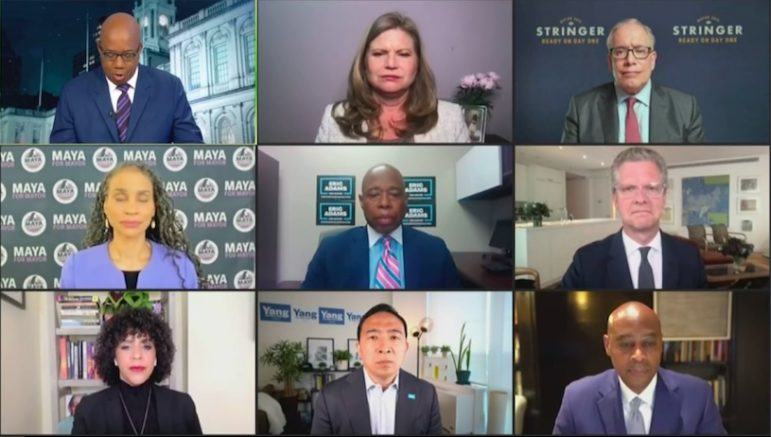Eight Democratic candidates faced off Thursday in the first mayoral debate of the 2021 election, where crime and safety was a central focus of the discussion.

Screengrab/Spectrum News NY1
NY1 moderator Errol Louis with eight of the Democratic candidates running for mayor.Eight Democratic contenders for mayor faced off in a debate Thursday night, the first opportunity for both front-runners and lesser-known names to argue their ideas for New York City’s future.
Eric Adams, Shaun Donovan, Kathryn Garcia, Ray McGuire, Dianne Morales, Scott Stringer, Maya Wiley and Andrew Yang participated in Thursday’s debate, which was co-hosted by NY1, WNYC, and THE CITY.
With almost 50 mentions, crime and safety dominated much of the conversation, with candidates detailing how they would work toward a safer city, given the increase this year in shootings. The city saw 149 shooting incidents in April compared to 56 shootings during the same month in 2020, according to NYPD statistics released this month.
Across the crowded field of Democrats, this was an opportunity for shades of nuance in each candidate’s policy to emerge—Dianne Morales, the former nonprofit executive who has drawn support from leftist groups in the city, went beyond the progressive plea to defund the police, saying that the city needs a plan to address the “system, not the symptoms,” affecting ailing communities. She’s proposed a $3 billion cut to the NYPD’s budget.
“Safety is not synonymous with policing,” Morales said. “We’ve got the largest municipal police department in the nation. If the size and the funding associated with policing equated safety we’d be the safest city in the country.”
It was a sharp contrast from comments offered by Brooklyn Borough President Eric Adams, the cop-turned-politician who recently earned the endorsement of the New York Post’s conservative editorial board. Adams, a more recognized name in city politics, played up both his police officer past and his efforts to change the department through 100 Blacks in Law Enforcement in his criticism of defunding proposals. If elected, he said he would push the police department to develop a new unit made up of plainclothes officer—similar to a controversial unit that current Police Commissioner Dermot Shea disbanded last year.
“We have gun violence now,” Adams said. “And if we don’t re-institute a plainclothes unit … well-trained police officers to go after gang behavior—those gangs are driving the crime in the city— and stop the flow of guns to the city, we’re going to lose more young people.”
Front-runner Andrew Yang, who, like Adams, took a more defensive posture in this debate, also criticized proposals to defund the police.
“Let me be clear: Defund the police is the wrong approach for New York City,” Yang said, saying the city needs a “21st century form of policing” instead.
There was significant overlap in other areas of the safety conversation: Wiley, McGuire, and Garcia, among others, called for policing models that included mental health experts to respond to calls of New Yorkers in distress. All candidates agreed that video footage from shootings by police be automatically released, and almost all—with the exception of businessman McGuire—said the next police commissioner should come from outside the police department. And all but Morales, Wiley and Stringer called for more police in the subway system.
The city’s economic recovery from the COVID-19 crisis was also a central part of the debate Thursday, with some candidates, including Garcia, who leads the city’s sanitation department and recently received a coveted endorsement from the New York Times, calling for changes to fines and fees for small businesses. Stringer, a former frontrunner whose campaign is still reeling from recent sexual harassment allegations—which he has forcefully denied—said he would overhaul the city Department of Buildings.
Not mentioned Thursday: the looming eviction crisis, millennials, and pedestrian safety, among other things. The candidates briefly discussed plans to privatize some public housing developments, and Garcia did mention environmental justice issues in the city, but neither subject played a big role in the first debate.
Republican candidates for mayor will debate next, on May 26. Democrats square off again on June 2.
Below, City Limits’ political team offers its own assessment of how the candidates performed in Thursday’s event. Who do you think gave the strongest answers, and what grade would you give each contender? Let us know in the comments.
How’d They Do? City Limits Grades the Candidates’ First Debate Performance
Wiley: A
Hers was a strong voice throughout the debate — with solid answers, well-timed interruptions, and evidently a plan to attack Adams rather than her fellow progressives.
McGuire: A-
McGuire’s direct, detailed answers and no-nonsense delivery fit perfectly with the image he’s presenting to voters, and his cross-examination question to Yang was probably the best of those exchanges. Also, as has been the case on Zoom forums for months, McGuire’s webcam and lighting make him look great.
Morales: A-
She didn’t shy from her role as the furthest-left candidate, but offered clear and sober responses.
Adams: B+
He handled the front-runner role better than Yang in terms of policy substance, although he did get snippy and condescending with people who criticized him.
Garcia: B
No standout moments, no big flubs. Her proposal of gun buybacks and the exchange about restaurant inspections were underwhelming, though.
Yang: B
Yang played decent defense when questioned about his voting record and Venture for America, but didn’t offer a lot of compelling material, and set Morales up to take his UBI idea down a peg.
Stringer: B-
The comptroller’s answers were generally solid, and offered a nice mix of progressive ideology and policy detail, but he didn’t seem to get much time on the mic. Stringer didn’t hurt himself with this performance but there also was no “a-ha” moment to help him.
Donovan: C
He’s an incredibly accomplished and deeply knowledgeable public servant, but he devoted an inordinate amount of his mic time to extolling his singular accomplishments.









